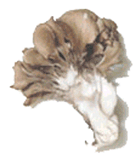
Maitake
Introduction
This fact sheet provides basic information about Maitake. The maitake mushroom is found in northeastern Japan but also grows and is cultivated in the United States and Europe. In China and Japan, maitake mushrooms have been consumed for 3,000 years, valued most for their legendary properties. Maitake's scientific name, G. frondosa , is derived from an Italian mushroom name referring to the gryfon, a mythological half lion and half eagle beast. Many years ago in Japan, the maitake actually had monetary value and was worth its weight in silver. In the late 1980s, Japanese scientists identified the maitake as more potent than lentinan, shiitake, suehirotake, and kawaratake mushrooms, all of which are used in traditional Asian medicine for immune function enhancement.
Common Names
Maitake (Japan), Huishu hua (China), King of Mushrooms, Dancing Mushroom, Monkey's Bench, Shelf Fungus
Latin Names
Grifola frondosa
What It Is Used For
- Maitake has been used for its antiviral action and to treat diabetes, high blood pressure, cholesterol, and obesity. Maitake has been studied to a limited extent for treating cancer; however, the information available is not sufficient to recommend it for this use.
How It Is Used
Maitake can be consumed in the diet or can be taken in tea, capsule or tablet form. The fruit body of the maitake mushroom is much higher in polysaccharide content than the mycelium. Consequently, using the fruit body is recommended for consumption or supplementation. Recommended doses for pure maitake are 3 to 7 grams per day. However, there are limited clinical studies to substantiate the efficacy or safety of this dose.
What the Science Says
- There are a limited number of well-designed clinical trials investigating maitake's effects in cancer therapy. Additional controlled studies are needed.
- Clinical case studies of liver, lung, stomach, breast, brain, and prostate cancers involving the use of maitake have been reported.
- In a study of 165 patients, results suggested that quality of life indicators had improved. Of these patients, 90% reported an improvement in cancer-treatment symptoms (eg, nausea, hair loss) and 83% reported pain reduction.
Side Effects and Cautions
Sources







